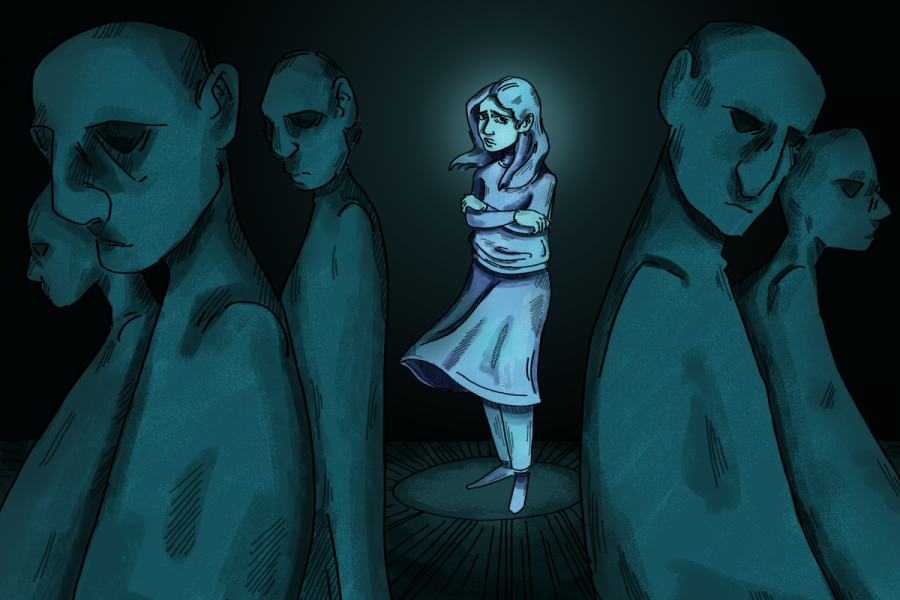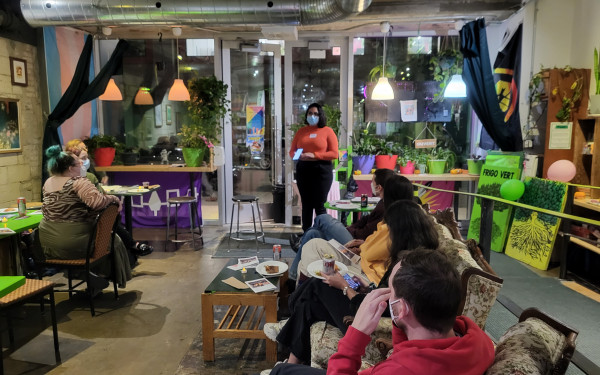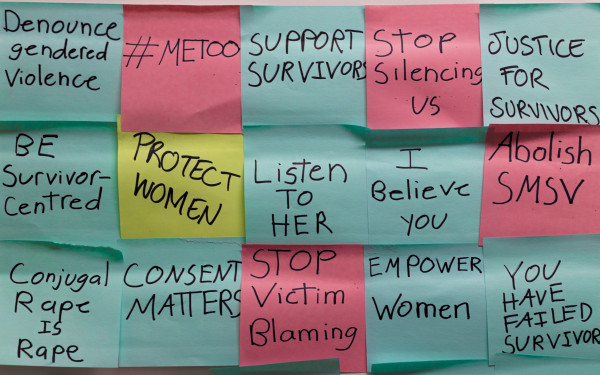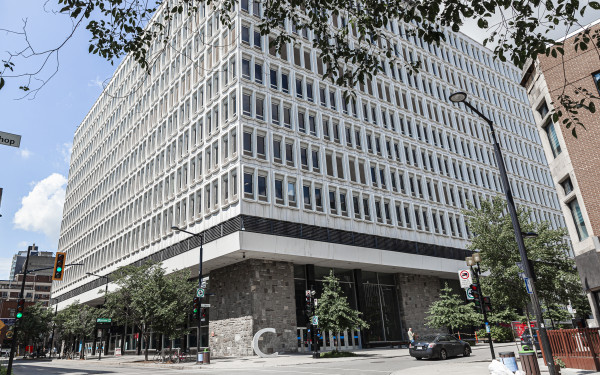Sexual Violence at Concordia: An Ongoing Fight for Justice
Concordia in Dire Need of Sexual Violence Policy Reform, Students Say
At the start of the Winter 2022 semester, Concordia student Katherine Leblanc’s theology class was moved online due to COVID-19 precautions. After texting her class group chat about the challenges of the course, Leblanc began receiving hateful messages from multiple male classmates. Their insults took a rapid turn.
In February 2022, Leblanc received a series of pornographic images and threats of bodily harm, including rape.
She followed Concordia’s sexual violence policy, which also applies to online harassment. As she attempted to seek justice for the harassment she endured, she said the university made it as difficult as possible for her needs to be met.
After filing a complaint to the Office of Rights and Responsibilities (ORR), Leblanc claimed she was left in the dark for weeks and routinely ignored by Concordia. After hiring a lawyer to get the university to respond, she claimed she finally received a reply with a hearing date the following day. “I shouldn’t have to get a lawyer to move my case to the tribunal,” Leblanc said.
“I’d been cooperating for weeks and they would not send my case to the tribunal. They just wouldn’t answer. Instead of telling me the process, they moved me from person to person,” she continued. “I was cooperating with Concordia but they would not listen.”
From the ORR to the Sexual Assault Resource Centre (SARC), Leblanc never felt heard or properly taken care of by the institutional bodies meant to handle sexual violence on campus.
The history of sexual violence on Quebec campuses goes back decades. Years of advocacy from university and CEGEP students led to Quebec passing Bill 151 in 2017, an Act to prevent and fight sexual violence in higher education institutions.
In compliance with the new law, Concordia created the Standing Committee on Sexual Misconduct and Sexual Violence (SMSV) in 2018. Despite the mandatory inclusion of four student representatives on the committee, student members of the SMSV say they have routinely felt ignored and outnumbered by the administration.
In October 2022, the Concordia Student Union (CSU), the Graduate Students' Association (GSA), and the Teaching and Research Assistants at Concordia (TRAC) union began a boycott of the SMSV. They demanded student-led solutions, transparency, and gender equity.
In response to the boycott, Concordia appointed four students to the SMSV, potentially violating the Accreditation Act by not having representatives from student unions. The identities of these students have not been revealed.
Limited Resources, Limited Impact
After Leblanc was sexually harassed, she consulted SARC for assistance. She was given information about mental health and other services available to her, but didn’t find much use from them.
Faced with physically returning to her classroom once in-person learning resumed, Leblanc was frustrated with Concordia’s Sexual Assault Response Team, made to help survivors navigate campus. “Just trying to get security to accompany me to class was a nightmare,” she said.
SARC was created in 2013 largely due to student-led efforts from the Centre for Gender Advocacy and in collaboration with Health Services, the Dean of Students Office and other units on campus. It is the primary point of contact for members of the university experiencing any form of sexual violence.
For Jennifer Drummond, SARC’s manager, the centre has two missions: support and prevention. “The centre provides counseling, academic and health accommodations, and other resources,” she said.
Currently, SARC employs two counselors, a facilitator, and a project coordinator, according to Drummond. Volunteers fill the other posts.
One of SARC’s responsibilities is the handling of sexual assault disclosures.
In Concordia’s annual reports, which are required by Bill 151, the university categorizes instances of sexual assault reported by students between disclosures and complaints.
The report defines disclosures as signaling a situation without going as far as filing an administrative complaint. Disclosures are resolved with accommodation measures for the survivor.
In Concordia’s 2021-2022 report, 111 disclosures were filed.
Many students have criticized the way SARC operates. In a 2018 report, 70 per cent of people who sought the centre’s help were dissatisfied with the outcome of their cases.
Olivia, a member of the CSU’s campaigns department who has been given a pseudonym to protect her identity, argued that institutional changes are needed. “Only 10 per cent of assaults on Quebec campuses ever get reported,” she said. “And from that 10 per cent, how many actually get any follow-through? Accountability is incredibly hard to achieve at Concordia,” she said.
“The issue with SARC is that it’s not staffed enough to deal with the entire Concordia population,” comprised of over 50,000 people, Olivia added. “Rates of sexual violence are incredibly high—over one in three people will be assaulted on campus in Quebec. We need SARC to be well-staffed, which includes raising budgets.”
Drummond said she felt that SARC was well-equipped by the administration, but that more can always be done. “I think that with a community of this size, we can always have more counselors and resources,” she said.
If Concordia wants to fix its rape culture, Olivia believes the university must invest in better prevention. She criticized Concordia’s online sexual violence trainings, which were made mandatory by Bill 151.
She said all mandatory trainings should be annual, in-person and involving a facilitator. “If Concordia wants to call itself a next-generation university or a feminist space, it needs to care about survivors more than its bottom line.”
Processing Violence
Once survivors consult with SARC, they are encouraged to file a complaint if they are comfortable, Drummond explained. According to Concordia’s policy, complaints are formal measures aimed at taking action against alleged perpetrators.
The report makes a distinction between informal complaints, which “are often resolved to the satisfaction of both parties,” and formal complaints, which “can lead to disciplinary measures.”
Informal complaints can result in an apology letter, community service, or a no-contact agreement, Drummond said. It is a non-disciplinary option, but can escalate to a formal complaint.
Formal complaints involving students will be sent to the Office of Student Tribunals, where a hearing will take place. If a survivor’s case involves a member of the administration or faculty, an investigation is planned. Disciplinary action may be taken, and final results are in the hands of panelists trained in part by SARC, Drummond explained.
Formal complaints can lead to a note on file, suspension, restricted access to the campus, expulsion or firing. According to the latest annual report, 18 complaints were reported in 2021-2022.
Sexual violence complaints are handled by the Office of Rights and Responsibilities (ORR), the body charged with resolving all incidents where the Code of Rights and Responsibilities has been allegedly violated.
When Leblanc attempted to file a complaint with the ORR, she was met with seemingly endless problems. “The whole time I dealt with the ORR, nothing was explained to me. It felt like I wasn’t worth their breath.”
Because sexual violence had been involved in her case, Leblanc wanted to take it to a student tribunal. She claimed her requests were ignored by ORR members.
Leblanc spent her summer in Zoom meetings with the ORR, forced to retell her story multiple times to many different people. She recalled Drummond sitting in during one of the meetings and offering her words of support, but nothing substantive came out of their interaction.

“We are not a reporting office. We just receive disclosures, provide support and provide education,” said Drummond, explaining that reporting is handled by the ORR.
Bill 151 stipulates that universities must have separate policies pertaining to sexual violence that distinguish them from other policies. While Concordia meets these criteria, students have criticized the university for not having a body independent of the ORR to handle cases of sexual violence.
Drummond affirmed that SARC works very closely with the ORR on cases of sexual violence, helping guide members as they deal with complaints. Additionally, students who sit on student tribunals are given trainings by SARC for when they have to deal with sexual violence cases.
The Policy Problem
Concordia’s Standing Committee on Sexual Misconduct and Sexual Violence (SMSV) was created in 2018, following the implementation of Bill 151.
According to Concordia Spokesperson Vannina Maestracci, the SMSV “explores ways to strengthen prevention and response and so it reviews the policies, looks at responses, training and so on.” The SMSV does not rule over issues of sexual violence at Concordia, but rather looks into the policies and procedures used in such cases.
In 2018, Concordia student Elena, who has been given a pseudonym to protect her identity, sat as her union’s representative on the SMSV. At the time, the committee forced members to sign non-disclosure agreements with the university. Elena refused to sign the NDA and Concordia eventually stopped asking for it, despite her constant presence at the committee.
Elena recalled a board room filled with administration officials, lawyers and faculty representatives. Each meeting would begin with a lengthy speech from one of Concordia’s lawyers.
“Sometimes, they would send us massive documents the night before so that we didn’t have time to read through them in time,” Elena said. “We students would stay up all night making notes and organizing, and we’d enter meetings with solutions.”
After poring over reports, the students wanted to give their input. “They told us, ‘that’s really not what you should do in this meeting, we’re just here to discuss and get a general vibe. You’re all very loud.’ They wanted to let everyone speak, but nobody besides us had read the documents,” Elena added.
Elena recalled survivors standing before the committee, sharing their stories and experiences. “The administration sat in silence and rolled their eyes,” she said. “Watching survivors recount their trauma while crying hysterically as these overpaid motherfuckers scroll through Instagram, rolling their eyes, is just evil. That kind of behaviour is the true definition of SMSV.”
“The administration sat in silence and rolled their eyes. Watching survivors recount their trauma while crying hysterically as these overpaid motherfuckers scroll through Instagram, rolling their eyes, is just evil. That kind of behaviour is the true definition of SMSV.” — Elena, former SMSV member
Since its inception, Concordia’s sexual violence policy has been under harsh scrutiny. According to Sophie Hough, former student representative on the SMSV, systemic change must take place. Hough is a member of Students for Consent Culture (SFCC), the group responsible for the 2017 Our Turn report, a national action plan that examined 14 Canadian universities’ sexual violence policies. The Our Turn report gave Concordia a D- on sexual violence policies.
“Students on campus have been advocating pretty tirelessly since 2011 for a standalone sexual violence policy,” she said. According to SFCC, a standalone sexual violence policy is completely independent from the Code of Rights and Responsibilities—a requirement they claim Concordia does not meet.
For any changes in sexual violence policy, students, faculty, and other stakeholders must be included, Bill 151 states. The SMSV must have student representatives to function. In November 2022, the University appointed four new representatives from the student body at large.
When asked for the names of the current SMSV members, Maestracci would not disclose the information “due to concerns around the current climate for these members.”
The Link and The Concordian both reached out to SMSV Chair and Equity Director Lisa White for comment, but were denied. According to Maestracci, “the Chair of the Standing Committee still hopes to meet the CSU and GSA to discuss the issues with them directly, rather than through student media.”
An Alternative Approach
For some sexual violence survivors on campus, using the resources provided by the institution in which they were assaulted can be traumatizing. Many have to look outside the university for the help they need.
According to Deborah Trent, executive director at the Montreal Sexual Assault Centre (MSAC), universities are legally required to have services, procedures and policies in place to deal with sexual violence.
If universities fail to follow their own procedures, Trent said, survivors have the full right to seek guidance outside the institution. “They have every right to press charges; they have every right to go to the police,” she explained. “But for a whole lot of people, it's a really difficult decision.”
Since 2010, the organization has operated a Sexual Violence Helpline to ensure survivors have a place to share their experiences and get information and resources that best fit their case.
Nonetheless, since the SMSV boycott began in October 2022, students and workers have mobilized to create an alternative within Concordia.
In order to combat the restrictive nature of the committee and call for a complete restructuring of the university’s sexual violence policies, a grassroots, worker-led group called the Inter-organizational Table for Feminist Affairs (ITFA) was created.
ITFA contains a variety of student and worker groups at the university, including the CSU, GSA and TRAC. They aim to find solutions to sexual violence at Concordia from and for the people most affected by the issue.
TRAC delegate Mathilde Laroche said that the main problem with the current SMSV committee is rooted in its lack of student inclusion. "It doesn't give any space for students to be involved and informed or to have the right information to participate in the decision-making,” they said.
Julianna Smith, the CSU’s external affairs and mobilization coordinator, believes that very little meaningful change can be made through the SMSV. “Right now, the students are completely outnumbered on the SMSV committee,” said Smith. “So even when we are able to mobilize as students and work together, we’re always outvoted so we can’t actually put any initiatives forward.”
The need for student-centred solutions was an important part of the decision to boycott the SMSV.
“ITFA works within a transformative justice framework. It is important to have an organization that is authentically interested in addressing sexualized abuses of power,” said GSA representative Akinyi Oluoch.
“Addressing these abuses at their root will require worker, student, community, and survivor-led processes of justice,” she added.
With files from Hannah Vogan, Iness Rifay, Joëlle Jalbert, Maria Cholakova, Marieke Glorieux-Stryckman, and Zachary Fortier.
In a previous iteration of this article, a quote mentioned a correlation between the way sexual violence and plagiarism are handled at Concordia. This quote was incorrect: sexual violence falls under the Code of Rights and Responsibilities and plagiarism falls under the Academic Code of Conduct.
This article originally appeared in Volume 43, Issue 14, published March 21, 2023.







